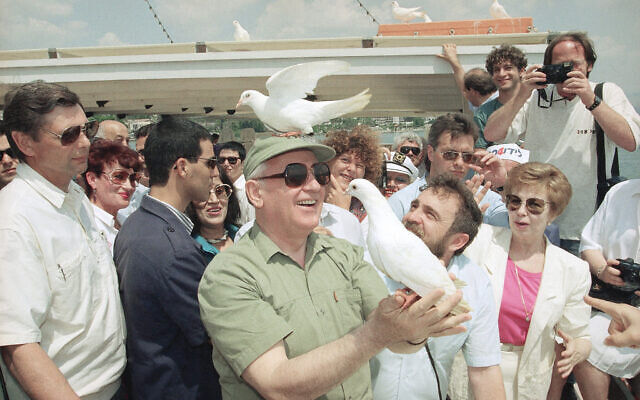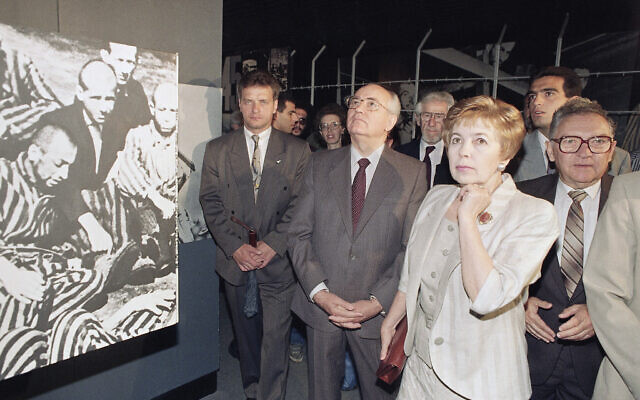An Extraordinary Man of His Times
"Politics is more and more turning into an imitation of democracy. All power is in the hands of the authorities and the president.""The economy is monopolized. Corruption has taken on colossal proportions."Former Soviet Leader Mikhail Gorbachev, 2013 statement"It is still difficult to say how the procedure [funeral of former Soviet leader Mikhail Gorbachev] will take place. It depends on the wishes of relations and friends.""[He] sincerely wanted to believe that ... a new romantic period would start between the renewed Soviet Union and the collective West.Those romantic expectations failed to materialize.""The bloodthirsty nature of our opponents has come to light, and it is good that we realized that in time."Dmitry Peskov, Kremlin spokesman"[Gorbachev was a] man who in six years destroyed our homeland and betrayed the whole socialist camp.""Did he know what he was doing? No, he didn't.""But he saw war -- more than one -- and each of them is on his conscience, because they were all the result of the breakup of the great Soviet Union."Vladimir Solovyov, Russian talk-show host, Moscow
 |
| A peace dove sits on the head of former Soviet President Mikhail Gorbachev on Monday, June 15, 1992 as he sets another bird free during a leisure trip on the Sea of Gallilee, Israel. (AP Photo/Jerome Delay) |
As far as the current Kremlin leadership is concerned, former Soviet leader Mikhail Gorbachev failed his nation in a bid to alter the strait-jacketed near-tyrannical rule of the Soviet Union, to transform it into a communist-style democracy to give its citizens greater personal freedoms, to open the USSR to warmer working relations with the West, to re-start the economy on the model of capitalism to bring the USSR into the late 20th century.
For bringing the Cold War to an end, for passively standing by while former satellite countries in Eastern Europe abandoned Mother Russia's stranglehold to declare themselves sovereign nations while shedding the mantle of communism, for opening Russia to improved relations with the West, Mikhail Gorbachev enjoyed wildly approving ratings within the international community. In his own Russian community he was loathed and criticized as a traitor to the nation.
In his later years he spoke about his intentions as opposed to the trajectory he had unwittingly unleashed leading to his formal 1991 declaration dismantling the Soviet Union. Explaining he could not possibly have risked igniting internal conflict by calling on his military to put down an insurrection of satellite states abandoning the forced collective. The very presence of a nuclear stockpile gave him pause for thought should a conflict ensue. So he stood by and watched his beloved USSR implode.
But the reforms he initiated in promoting multi-candidate elections, freeing political prisoners, allowing Russians to travel outside their country, inviting international investments in Russian industry and stimulating economic reforms, all had a liberating effect on the country. Still, the reality was that all these initiatives failed to produce the speedy economic results Russians were led to expect such a transition would result in.
Reviled in Russia, celebrated as a great historical figure of his time globally, Mikhail Gorbachev's death at 91 from a long illness has left the question whether he will be honoured as all past leaders have been, by a state funeral. And the answer appears to be that a state funeral will be bypassed for this man who did so much in his time to change the outcome of Russia's empire and its immediate relations with the West. Established protocol will be denied him.
Two things: given his reputation in Russia as a leader whose actions bordered on perceived 'treason', and given Russia's current state of complete estrangement from its Eastern European neighbours and the sanctions imposed by the West related to the Russian invasion of Ukraine and its bloody results; the expectation that the usual state ceremony would attract the presence of international world leaders paying homage to the recently departed is unrealistic.
The obvious reality is that Russians regard their former leader as an enemy of their nation, one who destroyed and dismantled the Soviet system, ending Russia's powerful period in history as a great empire, leaving the nation broken and millions of people living in a period of economic turmoil and deprivation, means he deserves no regard as someone special to Russia. And Russians now have their strongman-preference leader restored, in Vladimir Putin.
A leader who has invested himself in reversing all the reforms toward democritization of Russia that Mikhail Gorbachev worked so assiduously toward. Still he managed to pay a kind of back-handed homage to his penultimate predecessor: "[Gorbachev was a] politician and statesman who had a huge impact on the course of world history. He deeply understood that reforms were necessary. He strove to offer his own solutions to urgent problems."
Initially, Mr. Gorbachev supported Vladimir Putin during his early rule, viewing him as a democrat committed to continuing to pursue necessary reforms in Russia. Eventually sharp criticism followed in 2011 in angry denunciation over fraudulent elections and the announcement by Mr. Putin he planned to return to the presidency, provoking mass protests in Moscow.
In his later period of retirement from political life Mr. Gorbachev stated that his decision to step down instead of contesting the dissolution of the Soviet Union was motivated by a desire to avoid bloodshed. Mr. Putin, on the other hand, has brought Russia to war in his two decades in power no fewer than five times. Mr. Gorbachev is not known to have issued any public statements regarding Russia's invasion of Ukraine, since by that time he was severely ill. But it must have been the cause of great personal pain.
 |
| Former Soviet President Mikhail Gorbachev, center, and his wife Raisa, right, visit Yad Vashem, Israel's Holocaust museum and memorial, in Jerusalem, Tuesday, June 17, 1992. (AP Photo/Jacqueline Arzt) |
Labels: Dissolution of USSR, Mikhail Gorbachv, Russian Invasion of Ukraine, Soviet Leader, USSR, Vladimir Putin
0 Comments:
Post a Comment
<< Home